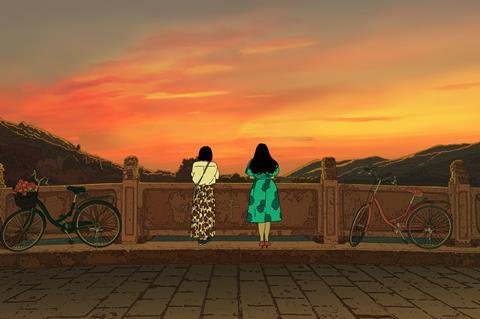
This year’s Berlinale marks the largest outing for China since the start of the pandemic, with six feature films and a drama series covering nearly all the sections. Two are in Competition: Korean-Chinese director Zhang Lu’s China-set The Shadowless Tower and Liu Jian’s animation Art College 1994, a late entry that was previously selected (but not officially announced) for last year’s Directors’ Fortnight at Cannes before being withdrawn.
“When there was a surge in Covid cases in Beijing, our post-production house had to close, and the film bureau too,” says Art College 1994 producer Yang Cheng, recalling how last year’s localised lockdown in Beijing caused delays to finishing the film as well as to censorship clearance. Yang also produced Liu’s Have A Nice Day, which in 2017 became the first Chinese animation ever to play in Berlin’s Competition.
“The new film is based on director Liu’s recollections of his art college days in the 1990s when China was opening up, which created a clash between modern and traditional culture,” Yang says. “It’s more wholesome, without the violence of Have A Nice Day.”
Dragon seal
Clearing censorship can be a lengthy process. A public screening permit from China Film Administration is a must for any release, without which screenings are prohibited. Only when the content has moved past the censors will the permit be issued — more commonly known as the ‘dragon seal logo’. It can been seen prominently above a serial number on a green background at the beginning of any approved film.
A separate permit for overseas screenings is required if the approved film is to be distributed outside China. Only two features from China played at each of the past three editions of the Berlinale, and none was selected for Cannes last year.
Directed by Huang Ji and her Japanese husband Ryuji Otsuka, China-set Stonewalling premiered in Venice’s Giornate degli Autori as a Japanese production, and Wang Xiaoshuai’s Thailand-set The Hotel, which premiered at Toronto, was marked as a Hong Kong production. In doing so, they can bypass China’s censorship.
The pandemic has caused inevitable delays. It is also understood there was a backlog of films for clearance because of last October’s 20th Party Congress, which determined China’s leadership for the next five years. That is now being cleared following the appointment of a new head of the film bureau.
For a film to take part in international film festivals, “a lot of communication is needed, as different departments from the regional and the national levels are involved”, explains Yang. “It is important to have experience in handling the communication, but censorship shouldn’t be seen as a hurdle as films still get cleared.”
Aside from the two films in Competition, two winners from 2021 will return to this year’s festival. Han Shuai (a Generation Kplus grand prix winner in 2021 with Summer Blur) and Zhang Dalei (whose Day Is Done won the Silver Bear for best short film in 2021) will present Korea-set Green Night — labelled as a Hong Kong production — in Panorama and iQiyi drama series Why Try To Change Me Now respectively.
“It’s a very special year, with an unusually large number of films from China,” says Hong Kong-based Jacob Wong, the Berlinale’s longtime delegate who preselected the mainland China feature films this year. Despite strict quarantine and travel restrictions, Wong still managed to visit China and scout for films, watching 70 mainland features during a two‑month stay in Beijing and a further 100 when he lived there for six months in 2021.
“With a 1.4 billion population, China has no shortage of talent and the number of films being made is enormous,” he says. “Unlike Europe, there’s no state subsidy in China for art films, but Chinese filmmakers can still find the means to get films made. They have such a strong urge to create and produce [despite] the tough circumstances.”
Yang concedes the pandemic has taken a toll on the industry. “At least 50% of the small- to medium-sized distribution companies shut down and many people simply left the industry,” he says. “But the creative people are staying put; their passion for film is their driving force.
“The industry — filmmakers, investors and cinema operators alike — has become more upbeat going into the new year. Everyone is pleased Covid is over and can’t wait to make a fresh start.”















![[L-R]: Amanda Villavieja, Laia Casanovas, Yasmina Praderas](https://d1nslcd7m2225b.cloudfront.net/Pictures/274x183/6/4/1/1471641_pxl_20251224_103354743_618426_crop.jpg)









No comments yet